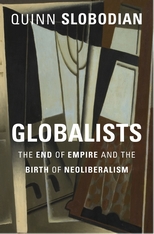The End of Empire and the Birth of Neoliberalism
Author Meets Critics Debate
Quinn Slobodian is a historian of modern German and international history with a focus on North-South politics, social movements, and the intellectual history of neoliberalism. Slobodian’s research and teaching places histories of modern Europe in the history of the larger world. Professor Quinn Slobodian (Wellesley College) will present his book Globalists: The End of Empire and the Birth of Neoliberalism (Harvard University Press, 2018), followed by comments from Stuart Ward and Niklas Olsen from the University of Copenhagen

The lecture is open to all and will be followed by a reception.
Neoliberals hate the state. Or do they? In the first intellectual history of neoliberal globalism, Quinn Slobodian follows a group of thinkers from the ashes of the Habsburg Empire to the creation of the World Trade Organization to show that neoliberalism emerged less to shrink government and abolish regulations than to redeploy them at a global level.
Slobodian begins in Austria in the 1920s. Empires were dissolving and nationalism, socialism, and democratic self-determination threatened the stability of the global capitalist system. In response, Austrian intellectuals called for a new way of organizing the world. But they and their successors in academia and government, from such famous economists as Friedrich Hayek and Ludwig von Mises to influential but lesser-known figures such as Wilhelm Roepke and Michael Heilperin, did not propose a regime of laissez faire. Rather they used states and global institutions - the League of Nations, the European Court of Justice, the World Trade Organization, and international investment law - to insulate the markets against sovereign states, political change, and turbulent democratic demands for greater equality and social justice.
Far from discarding the regulatory state, neoliberals wanted to harness it to their grand project of protecting capitalism on a global scale. It was a project, Slobodian shows, that changed the world, but that was also undermined time and again by the inequality, relentless change, and social injustice that accompanied it.
The lecture is part of the Author meets Critics series and is organized by Centre for Modern European Studies (CEMES) / the research group 'Rethinking European Integration'.
Details:
Time: 18 June 2018, 14:00-16:00 (precisely!)
The discussions are followed by a reception.
Place: The Saxo-Institute, Lunch Room (12.3.39), Karen Blixens Plads 8, building 12, 2300 Copenhagen S
Organizer: CEMES

Map of South Campus
Globalist.jpg


